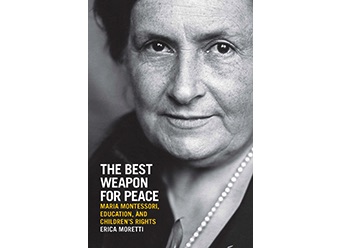. EDUCATION FOR PEACE .
A book review from The University of Wisconsin Press
This book is by Erica Moretti (see below).
“Innovative and extremely well-documented. This volume reframes the life and work of Maria Montessori within the context of international peace studies. She deserves recognition as a pioneer who faced gender barriers and nevertheless almost won the Nobel Peace Prize. Moretti gracefully weaves portraits of historical topics into this narrative of Montessori’s intellectual life.” —Mary Gibson, John Jay College and the Graduate Center–CUNY

The Italian educator and physician Maria Montessori (1870–1952) is best known for the teaching method that bears her name. She was also a lifelong pacifist, although historians tend to consider her writings on this topic as secondary to her pedagogy.
(Article continued in right column)
What is the best way to teach peace to children?
What is the relation between peace and education?
(Article continued from left column)
In The Best Weapon for Peace, Erica Moretti reframes Montessori’s pacifism as the foundation for her educational activism, emphasizing her vision of the classroom as a gateway to reshaping society. Montessori education offers a child-centered learning environment that cultivates students’ development as peaceful, curious, and resilient adults opposed to war and invested in societal reform.
Using newly discovered primary sources, Moretti examines Montessori’s lifelong pacifist work, including her ultimately unsuccessful push for the creation of the White Cross, a humanitarian organization for war-affected children. Moretti shows that Montessori’s educational theories and practices would come to define children’s rights once adopted by influential international organizations, including the United Nations. She uncovers the significance of Montessori’s evolving philosophy of peace and early childhood education within broader conversations about internationalism and humanitarianism.
Erica Moretti is an assistant professor of Italian at the Fashion Institute of Technology–SUNY. She is the recipient of the SUNY Chancellor’s Award in Scholarship and Creative Activities.
The book is published as part of the following series:
George L. Mosse Series in Modern European Cultural and Intellectual History
Steven E. Aschheim, Skye Doney, Mary Louise Roberts, and David J. Sorkin, Series Editors